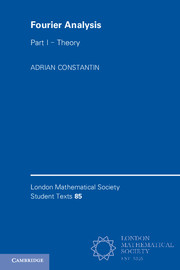Book contents
- Frontmatter
- Dedication
- Contents
- Preface
- 1 Introduction
- 2 The Lebesgue measure and integral
- 3 Elements of functional analysis
- 4 Convergence results for Fourier series
- 5 Fourier transforms
- 6 Multi-dimensional Fourier analysis
- 7 A glance at some advanced topics
- Afterword
- Appendix Historical notes
- References
- Index
3 - Elements of functional analysis
Published online by Cambridge University Press: 05 May 2016
- Frontmatter
- Dedication
- Contents
- Preface
- 1 Introduction
- 2 The Lebesgue measure and integral
- 3 Elements of functional analysis
- 4 Convergence results for Fourier series
- 5 Fourier transforms
- 6 Multi-dimensional Fourier analysis
- 7 A glance at some advanced topics
- Afterword
- Appendix Historical notes
- References
- Index
Summary
The Fourier series representation of a function is the function space counterpart of the decomposition of an n-dimensional vector into components with respect to an orthonormal basis for ℝn or Cn. To deal with the underlying infinite-dimensional setting some acquaintance with functional analysis is required. The present chapter aims to present the basic functional analytic framework. We introduce some powerful tools that will be used in Chapter 4 to gain insight into the behaviour of Fourier series.
An overall perspective
Despite Fourier's optimistic program for representing an arbitrary function by a trigonometric series, the convergence issue for Fourier series is a delicate matter. The challenge is twofold: with regard to the appropriate choice of functions, as well as concerning the suitable notion of convergence (with links between these two issues). Two results illustrate the intricate nature of trigonometric series. In 1872 Weierstrass used a trigonometric series to provide an example of a continuous but nowhere differentiable function (see Exercise 34 of Chapter 2). On the other hand, it was for a long time supposed that every function f which is periodic and continuous possesses a Fourier series which converges at every point to the function. In 1873 du Bois-Reymond exhibited a continuous periodic function with a divergent Fourier series at a point. Nevertheless, the intuition of Fourier, that for a large class of functions one can define the Fourier coefficients and recover the function from the knowledge of its Fourier coefficients, was essentially correct. Riemann's integral, introduced to deal with trigonometric series, showed great promise at first, but proved in the end to be insufficient to cope with the complexity of the problem. The surprising examples mentioned above shattered the confidence of mathematicians that Fourier series represent a convenient tool, so that towards the end of the nineteenth century, the subject of Fourier series appeared to be intractable and research in this direction reached a standstill. The resurgence of the topic at the beginning of the twentieth century was enabled by Lebesgue's theory of integration. It turns out that square Lebesgue integrable functions represent the class of functions with which Fourier series are most naturally associated. This specific setting was the main source of basic concepts in functional analysis, such as completion, separability and orthogonality.
Information
- Type
- Chapter
- Information
- Fourier Analysis , pp. 71 - 158Publisher: Cambridge University PressPrint publication year: 2016
